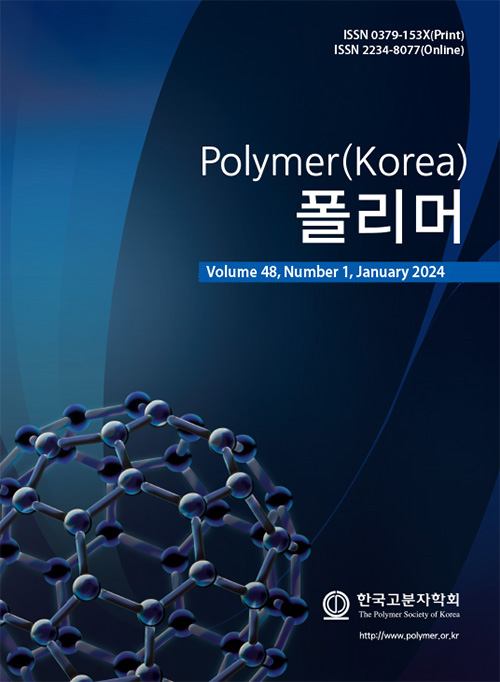- Influence of Dielectric Barrier Discharge Electrical Properties on the Surface Modification of Polyethylene
Chuan He, Yongqian Wu, Erping Deng,†
 , Yawen Zhou*, Zhu Zhang, and Lijian Ding
, Yawen Zhou*, Zhu Zhang, and Lijian DingSchool of Electrical Engineering and Automation, Hefei University of Technology, Hefei, Anhui, 230009, China
*School of Electrical Engineering, Xi'an Jiaotong University, Xi'an, Shanxi 710049, China- 유전체 장벽 방전 전기적 특성의 폴리에틸렌 표면 개질에 대한 영향
Reproduction, stored in a retrieval system, or transmitted in any form of any part of this publication is permitted only by written permission from the Polymer Society of Korea.
Dielectric barrier discharge (DBD) is a commonly used plasma surface modification technique, and the power parameters play a crucial role in influencing the modification results. Electrical properties of DBD pulses were studied by varying both power and frequency. Additionally, how these electrical properties influence the chemical and topographical alterations in polyethylene surface modification was investigated. In terms of chemical changes, we found that higher power supply significantly enhances the modification result, whereas alterations in frequency do not exert a substantial impact. Concerning topographical changes, increased power supply yielded similarly effective results, while heightened supply frequency improved the modification result due to the enhanced uniformity of discharge pulses. Regarding hydrophobicity, power supply exerts a more significant and pronounced influence compared to frequency.
Keywords: plasma, electrical properties, polyethylene, surface modification.
- Polymer(Korea) 폴리머
- Frequency : Bimonthly(odd)
ISSN 0379-153X(Print)
ISSN 2234-8077(Online)
Abbr. Polym. Korea - 2023 Impact Factor : 0.4
- Indexed in SCIE
 This Article
This Article
-
2024; 48(1): 101-111
Published online Jan 25, 2024
- 10.7317/pk.2024.48.1.101
- Received on Oct 24, 2023
- Revised on Dec 10, 2023
- Accepted on Dec 11, 2023
 Correspondence to
Correspondence to
- Erping Deng
-
School of Electrical Engineering and Automation, Hefei University of Technology, Hefei, Anhui, 230009, China
- E-mail: erping.deng@hfut.edu.cn









 Copyright(c) The Polymer Society of Korea. All right reserved.
Copyright(c) The Polymer Society of Korea. All right reserved.